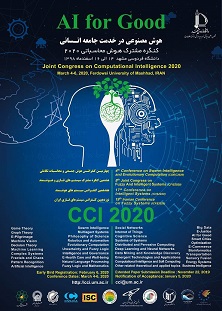|
برگزار کنندگان
انتخاب زبان
Login
|
 |  | |
The 2020 Joint Congress on Computational Intelligence Special Track: “Religious Studies and Computational Intelligence”
Guest editors
Dr. Behrooz Minaei Bidgoli, Associate Professor of Iran University of Science and Technology (IUST) Dr. Abdul Hamid Waseti, Assistant Professor of Research Institute for Islamic Culture and Thought (IICT) IntroductionThis track aims to bring together scholars, researchers, and experts in computational intelligence to present and explain the latest achievements of this field in religious studies. Nowadays, the development of computational intelligence technologies, in the field of intelligent information processing, and the existence of hidden and deep semantic layers of religious texts, has motivated researchers to investigate, further, in this area and discover propositions and rules, governing these texts. The discovery of new semantic layers of data in this field can effectively contribute to deepening the religious beliefs and practices in life. All researchers, academics, and experts are kindly invited to participate in the conference by sharing their research and practical findings by submitting their papers to make this track more productive and effective in fulfilling its goals. Scope and TopicsThe scientific scope of this track includes (but is not limited to) the following topics. The track will select presented (oral and poster) papers for publication, in the conference proceedings. 1. Retrieving information from religious texts 2. Detecting semantic similarities in religious texts 3. Discriminating religious texts in textual data 4. Extracting descriptive and inferential statistics from religious texts 5. Automatic topic detection of religious texts 6. Machine translation and interpretation of religious texts 7. Creation and introduction of knowledge graphs and ontologies for the religious studies 8. Entity linking and typing on religious knowledge graphs 9. Relation extraction, based on the properties (relation types) of knowledge graphs 10. Semantic role labeling, based on the religious knowledge graphs 11. Machine reading and natural language understanding for knowledge graph population 12. Discovering the relationships between religious events and their order of occurrence 13. Discovering the relationships and rules, governing religious sacred numbers and words 14. Discovering the statistical relationships between repetition, permutation, and the sequence of religious words and symbols 15. Automatic descriptive markups in religious data 16. Finding the rhythmic relationships of religious texts 17. Discovery of new propositions and beliefs, inferred from the extracted knowledge 18. Discovery of seemingly incompatible propositions in the extracted knowledge 19. Creating the reasoning tree of a proposition 20. Finding the semantic implications of a set of propositions on specific concepts (evangelism, warning, heaven, hell, God, the prophet, etc.) Paper submissionManuscripts should be submitted via the congress online platform. Manuscripts are expected to be minimum 4 and maximum 6 pages. Papers template is the same as what proposed on the congress website (https://cfis2020.um.ac.ir). In the case of any questions about the submission progress, the authors can be in contact with the guest editor, via the email address b_minaei@iust.ac.ir. | ||
 |  |
|
تاريخهاي مهم
منوي کنفرانس
|
